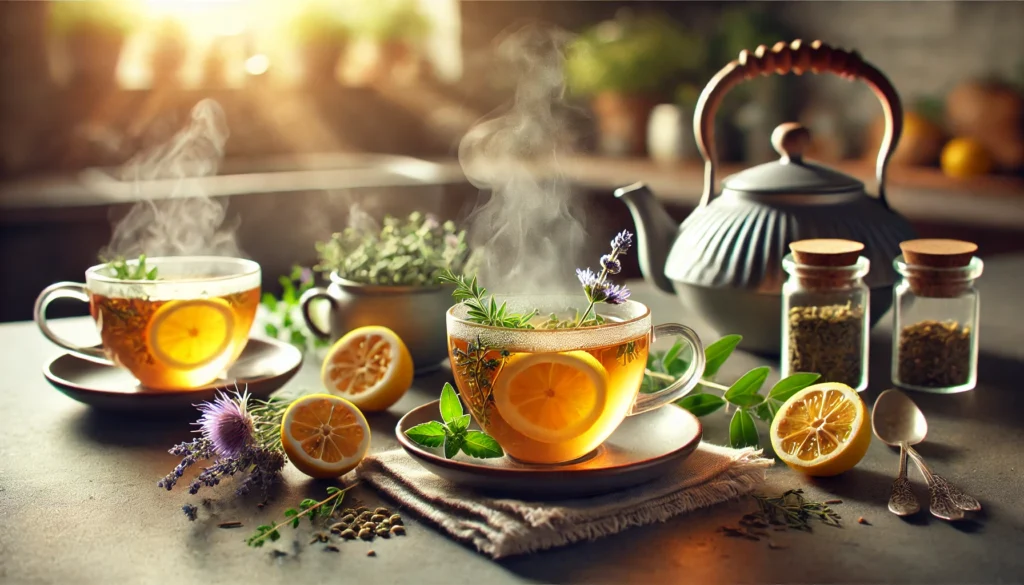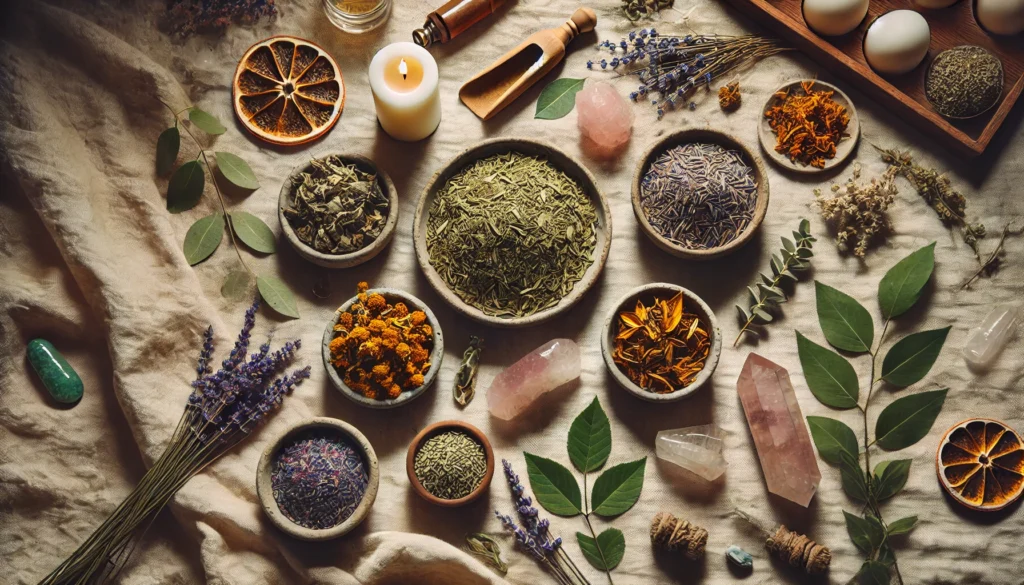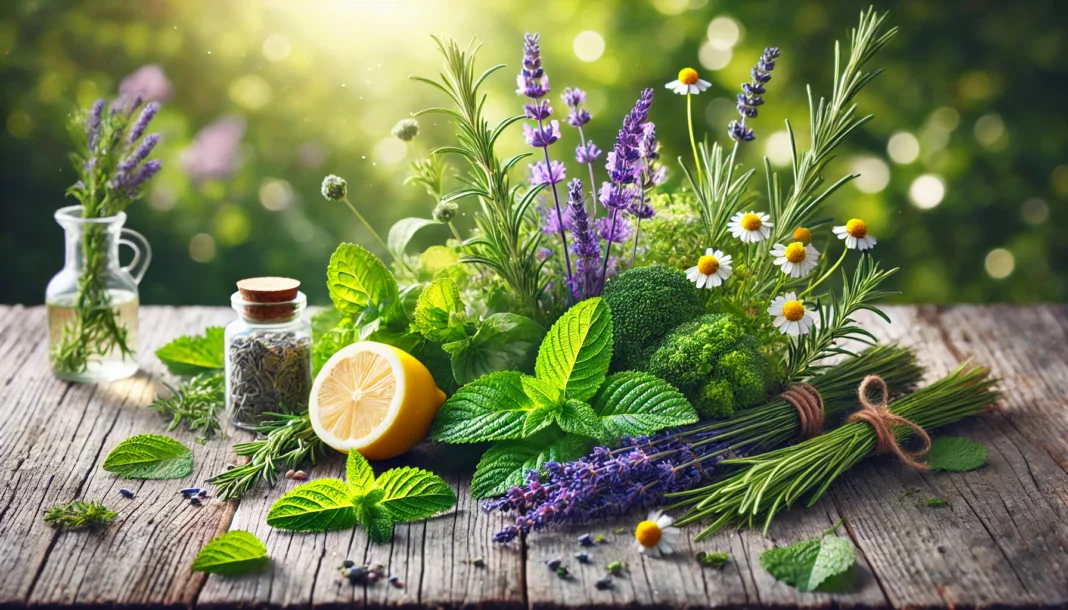In recent years, there has been a growing interest in exploring natural and holistic approaches to mental wellness. While conventional treatments for anxiety, depression, and emotional imbalance remain vital and effective for many individuals, a significant number of people are seeking complementary methods to enhance their psychological well-being. Among the most promising of these approaches are mood boosting herbs, which have been used for centuries in traditional medicine systems around the world. These herbs, often classified under the broader category of herbal adaptogens and holistic supplements, are now being rigorously studied for their potential to support emotional resilience, promote mental clarity, and elevate mood through naturally occurring bioactive compounds.
You may also like: Best Herbal Alternatives to Anxiolytics: Natural Remedies for Anxiety Relief
Understanding Emotional Health Through a Holistic Lens
Emotional wellness is a multifaceted component of overall health, encompassing the ability to manage stress, maintain balanced relationships, experience satisfaction, and cope effectively with life’s challenges. Unlike purely physical ailments, emotional difficulties often arise from a complex interplay of biological, psychological, and social factors. This complexity makes it particularly important to approach mental health support from multiple angles. Integrating lifestyle strategies such as nutrition, sleep hygiene, physical activity, mindfulness practices, and botanical supplementation offers a comprehensive way to nourish the mind and body simultaneously.
Holistic health frameworks emphasize the interconnection of mind, body, and spirit. Within this context, herbs for mood elevation are not viewed simply as pharmacological agents, but rather as plant-based allies that work in harmony with the body’s natural regulatory systems. Their role is often to gently nudge the nervous system, hormonal pathways, or inflammatory responses toward greater equilibrium, rather than forcing a dramatic shift. This makes them uniquely suited for long-term support and prevention, particularly in individuals experiencing subclinical emotional challenges or those recovering from more severe episodes with the guidance of a healthcare professional.

The Science Behind Mood Regulation and Herbal Support
Mood is regulated by a network of neurological, endocrine, and immune system interactions. Neurotransmitters such as serotonin, dopamine, and norepinephrine play key roles in the modulation of mood, motivation, and pleasure. Hormones like cortisol and adrenaline mediate stress responses, while inflammation and oxidative stress have increasingly been linked to depressive symptoms. Modern research into mood boosting herbs explores how specific botanicals influence these pathways. For example, some herbs contain natural monoamine oxidase inhibitors (MAOIs) that may enhance neurotransmitter activity, while others exhibit anti-inflammatory or adaptogenic effects that reduce the physiological burden of chronic stress.
Emerging evidence from clinical studies and animal models suggests that certain herbs for mood elevation can support neurotransmitter function, promote neurogenesis, and modulate the gut-brain axis—a bidirectional communication system between the gastrointestinal tract and the brain that is increasingly recognized for its impact on mental health. Importantly, many mood boosting herbs also possess antioxidant properties, which may help mitigate the cellular damage associated with prolonged psychological strain. When used appropriately and in conjunction with other therapeutic strategies, these herbs offer a promising complement to mental health care protocols.
St. John’s Wort: A Widely Studied Natural Antidepressant
Among the most well-known and extensively studied mood boosting herbs is St. John’s Wort (Hypericum perforatum). Native to Europe and parts of Asia, this yellow-flowered plant has a long history of use in traditional medicine for treating nervous disorders, melancholia, and sleep disturbances. Modern pharmacological research has identified several active constituents—such as hypericin and hyperforin—that appear to influence serotonin, dopamine, and norepinephrine levels in the brain.
Multiple meta-analyses have concluded that St. John’s Wort can be as effective as standard antidepressant medications for mild to moderate depression, with a more favorable side effect profile in many cases. However, it is essential to approach this herb with caution, as it is known to interact with a wide range of medications, including oral contraceptives, anticoagulants, and antidepressants. These interactions are primarily due to its induction of the cytochrome P450 enzyme system, which can accelerate the metabolism of various drugs. Therefore, individuals interested in using St. John’s Wort should consult with a qualified healthcare provider to ensure safe and effective use.

Ashwagandha: A Resilience-Enhancing Adaptogen
Ashwagandha (Withania somnifera), an adaptogenic herb rooted in Ayurvedic medicine, is gaining widespread popularity for its ability to modulate the stress response and support mood stability. Adaptogens are a unique class of botanicals that help the body adapt to physical and emotional stressors by promoting homeostasis. Ashwagandha’s active compounds, including withanolides, are believed to exert anxiolytic and neuroprotective effects through multiple mechanisms, including cortisol regulation, GABA receptor modulation, and reduction of systemic inflammation.
Numerous clinical studies have found that ashwagandha supplementation can significantly reduce symptoms of anxiety and perceived stress, often accompanied by improvements in sleep quality, energy levels, and cognitive function. These effects make it a valuable herb for mood elevation, particularly in individuals dealing with chronic stress, burnout, or adjustment difficulties. Because it is generally well tolerated and non-sedating, ashwagandha is often used as a foundational herb in holistic mental wellness protocols. Its gentle yet powerful action on the endocrine system allows for sustained emotional resilience over time.
Frequently Asked Questions About Mood Boosting Herbs and Emotional Wellness
What are some lesser-known mood boosting herbs that may support emotional wellness? While widely recognized options like St. John’s Wort and Ashwagandha dominate the conversation, several under-the-radar mood boosting herbs deserve more attention. For instance, Albizia julibrissin, also known as the Persian silk tree, has been used in traditional Chinese medicine to help ease grief and promote emotional lightness. Similarly, schisandra berry, a staple in adaptogenic herbalism, is believed to enhance mood by balancing the HPA axis and supporting mental clarity. These herbs work subtly but cumulatively, often showing greater effectiveness when integrated into a broader wellness regimen. Exploring a diverse array of herbs for mood elevation can open up more tailored, individualized approaches to emotional support.
Can mood boosting herbs be used alongside psychotherapy or counseling? Absolutely. In fact, using mood boosting herbs in tandem with psychotherapy may enhance the therapeutic process by improving emotional stability, increasing mental focus, and alleviating background anxiety. Herbs such as Rhodiola rosea or lemon balm can help prepare the nervous system for more productive sessions by gently modulating stress responses. When combined with therapy, these herbs may support neuroplasticity and emotional receptiveness, which are key to long-term psychological growth. It’s important to work with a therapist who is informed about integrative mental health practices, ensuring that herbs for mood elevation are introduced thoughtfully and without disrupting existing treatment plans.
How do lifestyle factors influence the effectiveness of herbs for mood elevation? The benefits of mood boosting herbs are often amplified by supportive lifestyle practices such as quality sleep, regular exercise, a balanced diet, and stress management techniques. For instance, taking ashwagandha while engaging in a consistent yoga or mindfulness routine may enhance its cortisol-lowering effects. Similarly, a nutrient-dense diet rich in omega-3 fatty acids and magnesium can work synergistically with herbs like saffron or lavender to stabilize mood. Herbs are not magic bullets; they function best when introduced into a lifestyle that promotes neurochemical balance and emotional regulation. In this context, herbs for mood elevation act as allies that complement—not replace—holistic self-care practices.
Are there gender-specific considerations when choosing mood boosting herbs? Yes, gender-specific hormonal and physiological differences can influence how individuals respond to herbs for mood elevation. For example, women dealing with PMS or perimenopausal mood swings may find chasteberry or Dong Quai beneficial in regulating hormonal fluctuations. Men under chronic stress might respond better to adaptogens like Panax ginseng or Rhodiola, which support testosterone and resilience. While herbs like holy basil are considered broadly effective across genders, personalized formulas that account for hormonal cycles or reproductive health may yield more nuanced and effective results. Always consult a practitioner with experience in gender-aware herbal therapeutics for the most tailored guidance.
Can mood boosting herbs affect cognitive function as well as emotional well-being? Many herbs for mood elevation have dual-action effects that benefit both cognitive and emotional health. Bacopa monnieri, for instance, is often used to reduce anxiety while enhancing memory and learning capacity. Rhodiola rosea improves fatigue-related cognitive decline, while lemon balm is known for calming the mind and improving attention span. These cognitive benefits often go hand-in-hand with emotional improvements, as better focus and mental clarity reduce the risk of rumination and cognitive distortion. Therefore, individuals experiencing brain fog or decision fatigue along with emotional imbalance may find these herbs particularly beneficial.
What are the potential social and cultural impacts of increased reliance on herbal remedies for emotional support? As mood boosting herbs become more mainstream, they may help destigmatize the conversation around mental health by normalizing natural, proactive approaches to emotional care. Culturally, this shift can revalorize traditional knowledge systems such as Ayurveda and Traditional Chinese Medicine, promoting intercultural appreciation and diversity in healing practices. However, it’s important to navigate these dynamics ethically, recognizing the indigenous and ancestral roots of many herbal systems. Increased popularity can also raise issues of sustainability, as overharvesting certain herbs can threaten ecosystems. As interest grows, so too does the need for responsible sourcing, education, and cross-cultural respect in the use of herbs for mood elevation.
How long does it typically take to notice the effects of mood boosting herbs? The onset of noticeable effects varies depending on the specific herb, the dosage, and the individual’s biochemistry. Some herbs, like lemon balm or lavender, may produce calming effects within an hour of ingestion, especially when taken as teas or tinctures. Others, like ashwagandha or Rhodiola, often require daily use for at least two to four weeks before significant changes in mood or stress resilience are observed. This delayed onset underscores the importance of consistency and patience when working with herbs for mood elevation. Unlike pharmaceutical interventions, these herbs typically support subtle, cumulative shifts in baseline emotional tone.
Are there any risks or ethical concerns associated with the commercial production of mood boosting herbs? Yes, as demand for herbs for mood elevation increases, there are both ecological and ethical concerns to consider. Overharvesting of wild herbs like Rhodiola rosea can endanger native populations and disrupt delicate ecosystems. Additionally, labor practices in some regions may not align with fair trade or ethical harvesting standards, raising concerns about exploitation. For these reasons, it’s crucial to seek out herbal products from companies that prioritize sustainable sourcing, transparency, and community partnerships. Supporting local or biodynamic herb growers when possible can also help mitigate these issues while enhancing the potency and integrity of the herbs.
Can mood boosting herbs be used to support long-term emotional resilience, not just temporary relief? Indeed, many mood boosting herbs offer long-term benefits by addressing the underlying physiological and neurological factors that contribute to chronic stress, anxiety, and mood imbalances. Adaptogens like holy basil and reishi mushroom, for example, promote a recalibration of the stress response system over time, fostering a deeper sense of inner stability. These herbs gradually enhance resilience, allowing individuals to better navigate future challenges without being emotionally overwhelmed. Incorporating herbs for mood elevation into a daily routine can be likened to emotional strength training, where small, consistent practices yield significant gains over the months and years. This approach aligns well with a preventive model of mental wellness rather than a reactive one.
What future trends or innovations might shape the use of herbs for mood elevation? Future developments may include more personalized herbal protocols based on genetic, hormonal, and microbiome data. Advances in nutrigenomics and systems biology are enabling researchers to identify how individual differences influence responses to mood boosting herbs. Additionally, new delivery methods—such as nanotechnology-enhanced herbal extracts or transdermal patches—could improve bioavailability and convenience. Integrative digital health platforms might also incorporate herbal tracking features, allowing users to log mood shifts in relation to herb intake for more informed adjustments. As research and technology evolve, the field of botanical mental health is likely to become increasingly sophisticated, offering more targeted and effective approaches to emotional support.

Rhodiola Rosea: Enhancing Mental Performance and Combating Fatigue
Another adaptogenic herb that has shown promise in the realm of mood and cognitive support is Rhodiola rosea. Native to cold, mountainous regions of Europe and Asia, Rhodiola has been traditionally used to combat fatigue, enhance physical endurance, and promote vitality. Scientific research has confirmed its adaptogenic properties, particularly in reducing the physiological impact of stress and improving symptoms of burnout and mild depression.
Rhodiola’s active compounds, including rosavin and salidroside, are thought to influence serotonin and dopamine activity while modulating the hypothalamic-pituitary-adrenal (HPA) axis. By helping to regulate the body’s stress response and support energy metabolism, Rhodiola can contribute to improved mood, focus, and motivation. It is particularly beneficial for individuals experiencing mental fatigue, low energy, and cognitive dullness—symptoms commonly associated with chronic stress and depressive states. As one of the more stimulating mood boosting herbs, it is often best taken earlier in the day to avoid potential interference with sleep.
natural mood enhancers, herbal stress relief, botanical mental health support, adaptogenic supplements, natural remedies for anxiety, emotional wellness herbs, plant-based anxiety relief, herbs that calm the mind, herbal adaptogens for stress, natural serotonin boosters, herbs to support nervous system, mind-body herbal therapy, herbal solutions for depression, cognitive support herbs, calming herbal teas, natural anxiety remedies, traditional herbal medicine for mood, holistic stress management, mental clarity supplements, natural ways to improve mood
Further Reading:
Medicinal Plants Used for Anxiety, Depression, or Stress Treatment: An Update
Herbs and supplements for depression
Herbs, Vitamins, and Supplements Used to Enhance Mood
Disclaimer
The information contained in this article is provided for general informational purposes only and is not intended to serve as medical, legal, or professional advice. While NewsHealthWatch strives to present accurate, up-to-date, and reliable content, no warranty or guarantee, expressed or implied, is made regarding the completeness, accuracy, or adequacy of the information provided. Readers are strongly advised to seek the guidance of a qualified healthcare provider or other relevant professionals before acting on any information contained in this article. NewsHealthWatch, its authors, editors, and contributors expressly disclaim any liability for any damages, losses, or consequences arising directly or indirectly from the use, interpretation, or reliance on any information presented herein. The views and opinions expressed in this article are those of the author(s) and do not necessarily reflect the official policies or positions of NewsHealthWatch.

